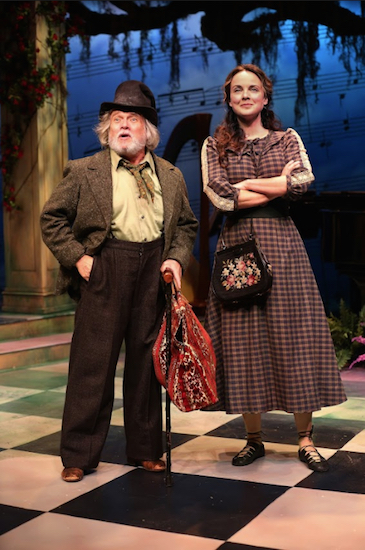Finian’s Rainbow at the Irish Repertory Theatre: An interview with Melissa Errico
‘A Light Heart Lives Long’ — Old Irish Proverb

When I was 18 in my freshman year at the University of Wisconsin, I took a film studies course called “The History of the American Musical Comedy.” Growing up in Brooklyn, my parents had been taking me to musicals on Broadway since I was in short pants. “Annie Get Your Gun,” “The Pajama Game,” “The King and I” and, of course, “The Sound of Music.” All of those musicals had some dancing, but nothing had prepared me for the sheer exuberance and robust vitality of the dancing in MGM’s “Seven Brides for Seven Brothers,” which I first saw in that Wisconsin film class.
Based on Stephen Vincent Benet’s “The Sobbin’ Women” (itself based on “The Kidnapping of the Sabine Women,” a Roman legend dating to 750 B.C.) the film was directed by Stanley Donen and starred Howard Keel, Jane Powell and NYCB principal dancer Jacques d’Amboise. The amazing choreography was by Michael Kidd, born Milton Greenwald, the son of Jewish refugees from Czarist Russia, who was raised and educated in Brooklyn where he attended and graduated from New Utrecht High School. After being accepted at City College of New York, Kidd studied chemical engineering his freshman and sophomore years, but left after he received a scholarship to the School of American Ballet (founded by George Balanchine, Lincoln Kirstein and Edward Warburg), which was the “feeder” school for the New York City Ballet. In 1947, Kidd abandoned ballet to become a Broadway choreographer. He would go on to win five Tony Awards for choreography, the first of which was for his Broadway debut as a choreographer: “Finian’s Rainbow.”

Brooklyn Boro
View MoreNew York City’s most populous borough, Brooklyn, is home to nearly 2.6 million residents. If Brooklyn were an independent city it would be the fourth largest city in the United States. While Brooklyn has become the epitome of ‘cool and hip’ in recent years, for those that were born here, raised families here and improved communities over the years, Brooklyn has never been ‘uncool’.